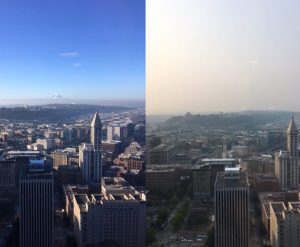Wildfire smoke causing smog in Tri-Cities and parts of King and Pierce counties. Conditions may be unhealthy. https://t.co/Bo1FSbcqln. pic.twitter.com/E9es4WP3zV
— WA Department of Ecology (@EcologyWA) August 9, 2017
Pacific Northwest endures historic heat wave while smoke from B.C. wildfires pollutes the region
The Pacific Northwest region of the United States is in the midst of a heat wave that has come close to breaking previous temperature records.
In the past 123 years, triple-digit temperatures have only been recorded on three days in Seattle — and though the city remained below triple digits last week, the high reached 94 degrees, hitting a daily record. Meanwhile, Portland experienced even higher temperatures, reaching a high of 105 degrees on Thursday. This was just shy of the warmest temperature ever recorded in Portland, which was 107 degrees.

Though other parts of the country are accustomed to triple-digit temperatures in the summer, the infrequency with which it occurs in the Pacific Northwest region means many area residents do not have air conditioning at home. In Portland, around 30 percent of homes and apartments lack air conditioning and in Seattle, two-thirds of households are without air conditioning. Communities across the region have opened cooling centers, which are designated public spaces for those who do not have air conditioning at home; they include public swimming pools, community centers, movie theaters, and malls.
While the Pacific Northwest is dealing with the historic heat wave, it is also being affected by smoke which has been carried south from the many wildfires currently raging in British Columbia. A large portion of coastal Washington and Oregon, including the areas surrounding Portland and Seattle, have been deemed “unhealthy” by the EPA; this means those in the area are at risk of experiencing health effects from the air pollution, regardless of any preexisting medical issues.
The smoke from the wildfires interacts differently with the heat wave, depending on the time of day. When the sun is shining, the smoke particles reflect some of the sun’s rays back into the atmosphere, which limits the temperatures on the surface. At night, the smoke’s retained heat keeps the temperature warm; Seattle’s low on Wednesday, August 2, was 12 degrees warmer than usual. As people sensitive to air pollution are being urged to remain indoors, the Washington State Department of Ecology warns that the air quality may become further degraded due to the wildfires in British Columbia and the local heat wave.
A spokesperson from Portland General Electric told Willamette Week that in preparation for the heat wave, the company would provide air conditioning for some of its equipment, which can be strained by extreme temperatures. In addition to the temperature itself, electricity providers are also at risk of being overwhelmed by an increase in energy consumption prompted by a sudden spike in air conditioning usage. On Tuesday, August 1, Portland General Electric reported power loss to 3,667 customers. Due to the sustained high temperatures at night, overheated equipment has no chance to cool off, meaning that even more power outages are expected as the week progresses.
Sources and Further Reading
- Pacific Northwest threatened by hottest weather ever recorded; Seattle could hit 100 – The Washington Post
- Portland heat wave: Worst-case scenario sees 109 degrees – The Oregonian
- Blistering Heat Wave Threatens Seattle, Where Only a Third Have Air-Conditioning – The New York Times
- Cooling centers open as excessive heat warning continues – KIRO7
- Over 100 active wildfire in British Columbia – Wildfire Today
- AirNow – EPA
- Why so much smoke in Seattle from B.C. wildfires? ‘Nature’s air conditioning’ is broken, weather service says – The Seattle Times
- Where’s the AC? Heat grips Portland, Seattle – CNN
- Haze hangs over Seattle as smoke from B.C. wildfires drifts into Washington – KIRO7
- As Record Heat Wave Bears Down, 271,300 Portland Homes Don’t Have Air Conditioning – Willamette Week
- Oregon Could Break Records For Power Consumption During Heat Wave – Oregon Public Broadcasting
